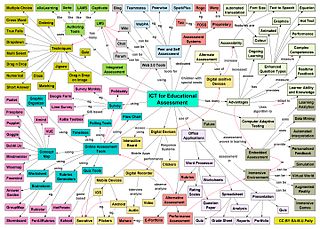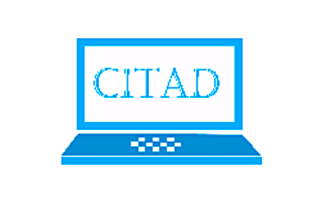The digital divide is the unequal access to digital technology, including smartphones, tablets, laptops, and the internet. The digital divide creates a division and inequality around access to information and resources. In the Information Age in which information and communication technologies (ICTs) have eclipsed manufacturing technologies as the basis for world economies and social connectivity, people without access to the Internet and other ICTs are at a socio-economic disadvantage, for they are unable or less able to find and apply for jobs, shop and sell online, participate democratically, or research and learn.
E-government is the use of technological communications devices, such as computers and the Internet, to provide public services to citizens and other persons in a country or region. E-government offers new opportunities for more direct and convenient citizen access to government and for government provision of services directly to citizens.
The global digital divide describes global disparities, primarily between developed and developing countries, in regards to access to computing and information resources such as the Internet and the opportunities derived from such access. As with a smaller unit of analysis, this gap describes an inequality that exists, referencing a global scale.

Community informatics (CI) is an interdisciplinary field that is concerned with using information and communication technology (ICT) to empower members of communities and support their social, cultural, and economic development. Community informatics may contribute to enhancing democracy, supporting the development of social capital, and building well connected communities; moreover, it is probable that such similar actions may let people experience new positive social change. In community informatics, there are several considerations which are the social context, shared values, distinct processes that are taken by members in a community, and social and technical systems. It is formally located as an academic discipline within a variety of academic faculties including information science, information systems, computer science, planning, development studies, and library science among others and draws on insights on community development from a range of backgrounds and disciplines. It is an interdisciplinary approach interested in using ICTs for different forms of community action, as distinct from pure academic study about ICT effects.

Information and communications technology (ICT) is an extensional term for information technology (IT) that stresses the role of unified communications and the integration of telecommunications and computers, as well as necessary enterprise software, middleware, storage and audiovisual, that enable users to access, store, transmit, understand and manipulate information.

Princess Sumaya University for Technology (PSUT), established in 1991, is a specialized, Non-governmental, Non-profit, Jordanian university, owned by the leading applied research centre in Jordan, the Royal Scientific Society (RSS). PSUT's area of specialization is IT, Communications and Electronics. As a nonprofit institution, PSUT embraces both the public and private sectors, but while akin to public universities in its mission, it is more aligned to the private sector in drive and spirit.

A telecentre is a public place where people can access computers, the Internet, and other digital technologies that enable them to gather information, create, learn, and communicate with others while they develop essential digital skills. Telecentres exist in almost every country, although they sometimes go by a different names including public internet access center (PIAP), village knowledge center, infocenter, Telecottage, Electronic Village Hall, community technology center (CTC), community multimedia center (CMC), multipurpose community telecentre (MCT), Common/Citizen Service Centre (CSC) and school-based telecentre. While each telecentre is different, their common focus is on the use of digital technologies to support community, economic, educational, and social development—reducing isolation, bridging the digital divide, promoting health issues, creating economic opportunities, and reaching out to youth for example.

'Gbenga Sesan is a social entrepreneur who delivers Information and communications technology to the under served. He has had a career in the application of Information and Communication Technologies for Development (ICT4D) – for individuals, institutions, nation-states, regional entities and the international community.
The VIA pc-1 Initiative is a project of VIA Technologies, established in January 2005, to help bridge the digital divide by developing information and communication technology (ICT) systems to benefit those who currently do not have computers or Internet access.
The Center to Bridge the Digital Divide (CBDD) was a self-sustaining outreach unit of the Washington State University Extension. Founded in 2001, the CBDD was an ICT4D organization committed to assisting under-served populations leverage information communication technologies (ICT) to better their lives and achieve desired goals. Unlike traditional digital divide initiatives, the CBDD's strategic focus was not on gaining access to technology but on helping target communities achieve successful application of ICT.
Information and communication technology in agriculture, also known as e-agriculture, focuses on the enhancement of agricultural and rural development through improved information and communication processes. More specifically, e-agriculture involves the conceptualization, design, development, evaluation and application of innovative ways to use information and communication technologies (ICTs) in the rural domain, with a primary focus on agriculture. ICT includes devices, networks, mobiles, services and applications; these range from innovative Internet-era technologies and sensors to other pre-existing aids such as fixed telephones, televisions, radios and satellites. Provisions of standards, norms, methodologies, and tools as well as development of individual and institutional capacities, and policy support are all key components of e-agriculture.
Susan Davis is an author, public speaker, consultant and expert on international development and social entrepreneurship. She is the Chairperson of Solutions Journalism Network, an Adjunct Associate Professor at New York University Stern School of Business, a coach to social entrepreneurs and active on many boards and advisory councils.
Chris Underhill is an English social entrepreneur.
Fundación Paraguaya is a leading edge self-sufficient social enterprise founded in Paraguay in 1985 that seeks to develop innovative solutions to poverty and unemployment, and proactively disseminate them throughout the world.

The Egyptian Ministry of Communications and Information Technology (MCIT) is a government body headquartered in Smart Village Egypt, Giza Governorate, in the Cairo metropolitan area. Established in 1999, the Ministry is responsible for information and communications technology (ICT) issues in the Arab Republic of Egypt including the planning, implementation and operation of government ICT plans and strategies. It is led by the Minister of Communications and Information Technology, who is nominated by the Prime Minister and is a member of the cabinet. The current ICT Minister is Amr Talaat who assumed the position on 14 June 2018.

Atef Helmy Nagib is an Egyptian communication and technology expert and the former minister of communications and information technology.

The University of AMIKOM Yogyakarta is a private IT college in Sleman Regency, Special Region of Yogyakarta, Indonesia. The college was established on December 29, 1992, under the auspices of the Yogyakarta AMIKOM Foundation. It has 2 diploma programs, 13 undergraduate programs, and 1 postgraduate program; all are accredited. The university concentrates on efforts to become the world's leading university in the field of the creative economy based on entrepreneurship. The university currently has more than 11,000 active students, and has more than 3,000 new students every year.

The Center for Information, Technology, and Development (CITAD) is a Nigeria non-governmental organisation that was established to promote democracy and active citizenship through information and communication technology in addendum with civic empowerment programs. It has its headquarter in Kano and branches in Abuja, Jama'are, Itas, Dutse, Azare, Gombe and Yobe States.









